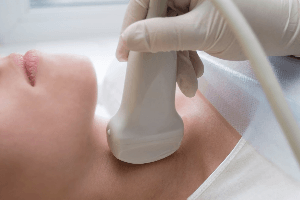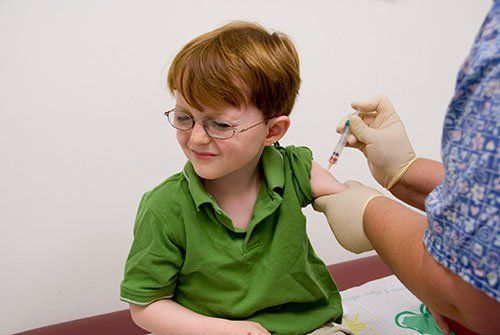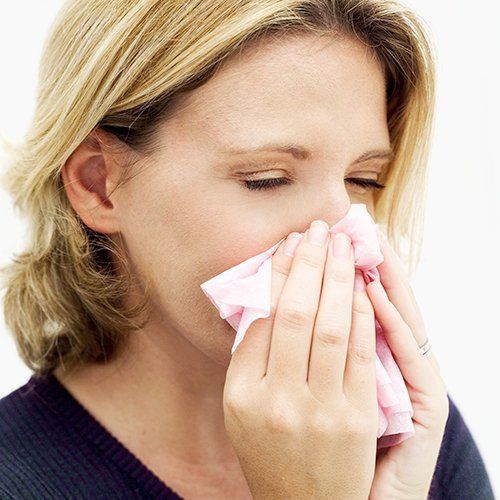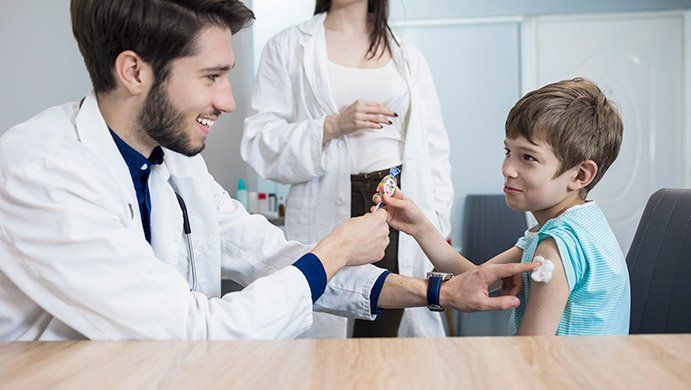How to Keep Your Child Safe and Healthy in the Summer
Admin • March 17, 2021

Summertime days outdoors provide your child with the chance to get out and get active. But warm weather activities also come with risks. Take a look at what you need to know to keep your child safe, healthy, and happy during the summer months.
Hydrate Well and Often
Between sports, pool days, and everything else your child does outdoors, hydration becomes a major issue. Signs of dehydration in children include a dry or sticky mouth; irritability; drowsiness; dizziness; or dry or cool skin.
To keep your child hydrated in the summer heat:
- Give them plenty of water. Fill a reusable water bottle before going outdoors. Refill the bottle as your child drinks the contents.
- Avoid soda and sports drinks. Even though these liquids may seem refreshing, they come with unnecessary (and often unhealthy) additives, such as sugar and caffeine.
- Limit juice. Like sodas and sports drinks, fruit juice also adds excessive sugar to your child's diet.
Take breaks during outdoor activities to minimize the risks of dehydration. Proper hydration is nonnegotiable. If your child refuses to drink, head indoors to cool down.
Avoid Ticks
Ticks hide in tall grass, trees, shrubs, leaf debris piles, and other similar outdoor areas. Reduce the risk of tick-borne disease (such as Lyme disease) with a few easy-to-follow steps:
- Wear long clothing. If possible, dress your child in clothing that covers their skin.
- Examine your child thoroughly. When your child comes inside, examine them for ticks. This includes spots you might not think to look, such as in between toes, in their belly button or under their hair.
- Bathe after outdoors activities. While a shower may not remove a tick, the U.S. Centers for Disease Control and Prevention (CDC) recommends showering within two hours of outdoor activity to reduce Lyme disease risks.
- Know the signs. Educate yourself on the signs of Lyme disease, such as a bull's-eye rash, fever, chills, joint pain, and fatigue.
Along with these preventative steps, cut your grass often and remove brush and debris from your yard. This decreases the likelihood of a tick invasion outside of your home.
Use Sun Protection
The sun's UV rays can cause serious and long-lasting damage to your child's skin. Avoid sunburns and later-in-life issues, such as wrinkles or skin cancer, with the proper protection steps. To minimize the chances of a burn or severe skin damage:
- Use sunscreen. Cover your child in a broad spectrum (UVA and UVB), water-resistant sunscreen with an SPF of 30 or higher. Apply the sunscreen 15 minutes before outdoor activities and reapply every two hours (or after swimming or sweating).
- Cover exposed skin. Along with sunscreen, cover your child's exposed skin (if possible) with SPF-treated clothing.
- Stay in the shade. Stick to shady areas during high-sunshine times, such as midday.
- Use a hat. Shade your child's head and protect their scalp with a sun hat.
- Use sunglasses. The eyes are also susceptible to the sun's rays. Make sure your child wears sunglasses during outdoor activities.
If your child does burn in the summer sun, watch for signs such as dehydration, nausea, blistering, dizziness, fatigue, fever, or oozing. These symptoms could indicate a serious skin issue that requires medical attention.
Get Active
It's easy to fall into a sedentary summer routine. Even though the park and pool are open for a day of play, some children prefer the comfort of an air conditioned home. If your child sits on the couch more often than you'd like:
- Go for a family walk. Take a walk around the block after dinner or walk (instead of drive) to your summertime activities.
- Have a dance party. When the weather is too warm to go outside, throw a living room dance party. Turn on your child's favorite music and dance the day away.
- Play an active game. Instead of computer games, switch off the screen and create a backyard obstacle course or play follow the leader.
Organized activities, such as summer camps, also offer an easy way to get kids up and out of the house during the non-school months.
Does your child have a bug bite, sunburn, or other summertime health issue? Contact Hampstead Medical Center, PC, for more information.

The IUD, or intrauterine device, is one of the most effective methods of birth control available. Unlike birth-control pills, you do not need to remember daily to administer medication, and the device itself lasts longer than shots and is easier to use than rings. Many women find all of these benefits desirable for a birth-control method. There are two general types of IUDs available to women. The first type is the copper IUD, and the other is hormonal. Which one is right for your personal birth-control needs?

Although the risk of cardiovascular disease increases as you get older, many people who die suddenly of a heart attack didn't previously know they had heart disease. That's why identifying risk factors for heart attack and stroke is so critical to cardiovascular health. Fortunately, with regular exams and the many types of screening tests available, doctors can detect early signs of heart disease.

Even if you've never had cause to doubt your thyroid function, if you're a female who has recently given birth, you may be at risk for thyroid issues. An estimated 12 percent of Americans deal with thyroid trouble at some point during their adult lives, and women are significantly more likely than men to develop a thyroid-related ailment. Unfortunately for new mothers, many of the most common signs of an underactive thyroid (like weight gain, mood swings, fatigue, and irritability) are also quite common for those dealing with a newborn's frequent night wakings and the realities of a post-partum body. Read on to learn more about some common (and not-so-common) signs that you could be dealing with a pregnancy-induced thyroid problem as well as some treatment options that can be safely administered or performed while you're breastfeeding. What Can Cause Thyroid Problems During Pregnancy? As with many other hormonal disorders, there are often more questions than answers when it comes to thyroid function. However, researchers have pinpointed a few factors and health conditions that can raise the risk of a woman’s developing a thyroid issue during or immediately after pregnancy. For example, while only around 7 percent of women are at a general risk of developing postpartum thyroiditis, this risk increases to 25 percent for women who have Type 1 diabetes or who dealt with elevated antithyroid antibodies during pregnancy. Women whose anti-peroxidase (anti-TPO) antibodies were elevated during pregnancy may have a 1 in 2 chance of developing postpartum thyroiditis, and those who have dealt with thyroid issues in the past (or during previous pregnancies) also deal with a significantly increased risk. In other cases, thyroid problems may have no cause that can easily be pinpointed; the rush of various hormones during pregnancy and the strain they can put on various systems, including the endocrine system, can create a sort of "perfect storm" in which thyroid problems may thrive. What Are Some Signs You're Dealing With Post-Pregnancy Thyroid Issues? Thyroid problems can take a number of forms, including hypothyroidism (an underactive thyroid), hyperthyroidism (an overactive thyroid), Graves' disease (an autoimmune condition that causes goiter), or Hashimoto's disease (an autoimmune condition in which the body's immune system attacks healthy thyroid cells, eventually stopping all thyroid function). The signs and symptoms for each thyroid disorder are unique and often at opposite sides of the spectrum. For example, hypothyroid patients often report being cold, having dry skin, sleeping more than normal, or gaining weight without trying while hyperthyroid patients sweat profusely, suffer from insomnia, and can lose a significant amount of weight in a brief period. Postpartum thyroiditis often manifests as either an underactive or overactive thyroid, which usually normalizes itself in a few months. Symptoms lasting longer than that or that appear to be getting worse may necessitate medical intervention. What Treatment Options for an Underactive Thyroid Are Best for New Mothers? Whether you suspect you have postpartum thyroiditis or have been formally diagnosed, you may be worried about how your potential treatment options could impact your ability to breastfeed and what effect (if any) they might have on your child. Fortunately, there are a number of effective options from which to choose. If your postpartum thyroiditis is deemed autoimmune in origin, there is some evidence that taking selenium supplements could help normalize your thyroid function without requiring you to take hormonal medication (which might pass into your milk supply). If your symptoms aren't severe and don't impact your daily life, you may instead opt for watchful waiting, maintaining contact with your doctor and reporting any worsening symptoms but avoiding medication or other treatment for the time being. However, if your doctor recommends supplemental thyroid hormone, this usually means some intervention is necessary to prevent permanent damage to your thyroid and the organs and systems that depend on a steady dose of hormones. Make an appointment with Hampstead Medical Center PC to get started taking care of your health.







